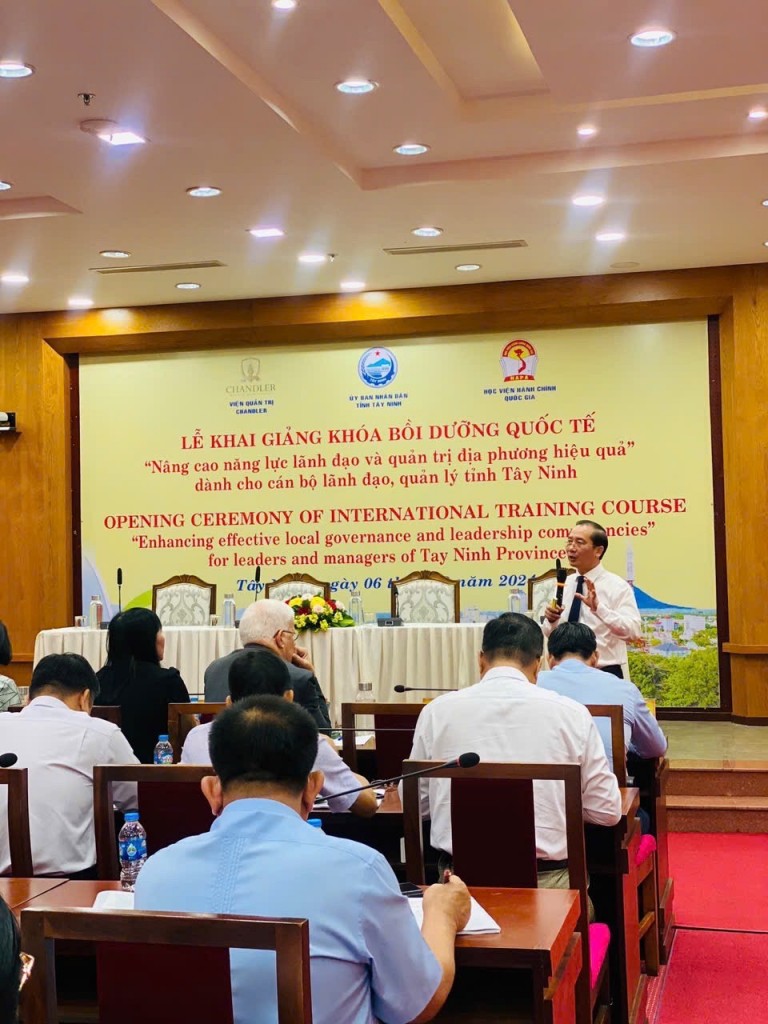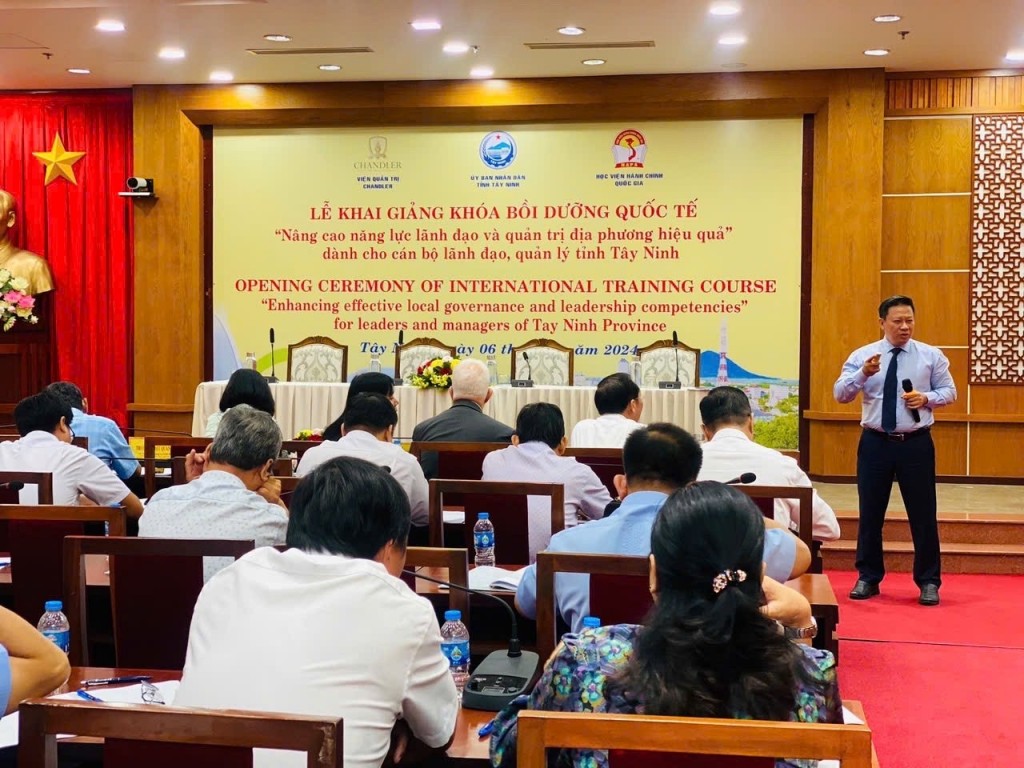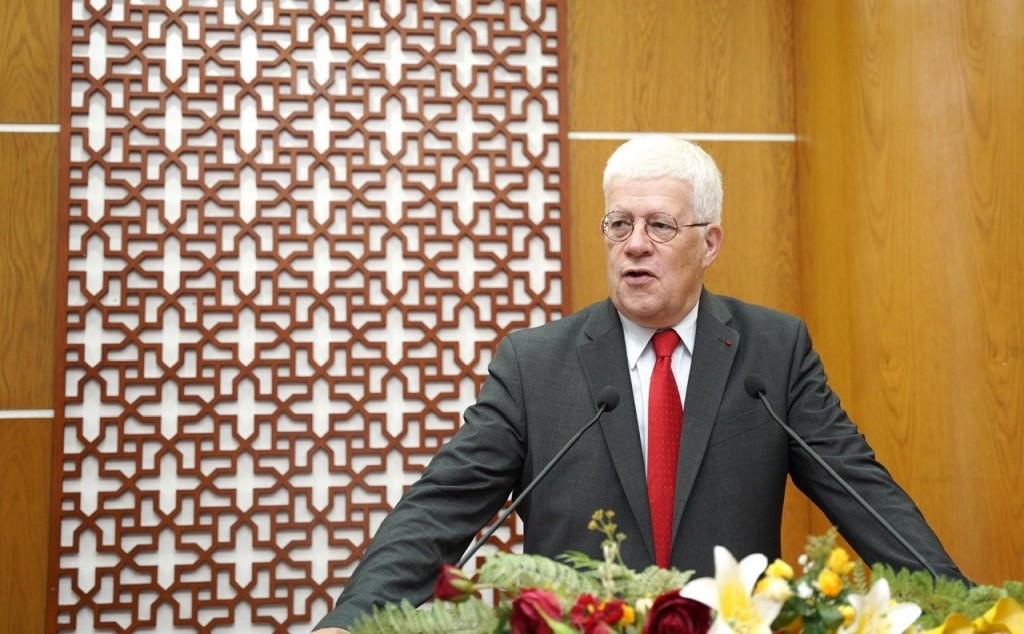Within the framework of the international training course “Enhancing effective local governance and leadership competencies” for leaders and managers of Tay Ninh province, on September 6, 2024, at the Tay Ninh Provincial Party Committee Conference Hall, the National Academy of Public Administration (NAPA), in collaboration with the People’s Committee of Tay Ninh Province and the Chandler Institute of Governance (Singapore), organized the international seminar “Leadership and local governance in the context of reform, integration and digitalization”.

Mr. Nguyen Thanh Ngoc, Chairman of the People’s Committee of Tay Ninh Province, Assoc. Prof. Dr. Nguyen Ba Chien, NAPA President, and Mr. Jean François Verdier, French expert, co-chairing the seminar.
Mr. Nguyen Thanh Ngoc, Deputy Secretary of the Provincial Party Committee and Chairman of the People’s Committee of Tay Ninh Province, Assoc. Prof. Dr. Nguyen Ba Chien, NAPA President, and Mr. Jean François Verdier, Inspector General of Finance, French Republic, co-chaired the seminar.
Also attending the seminar were leaders from the NAPA – Ho Chi Minh City Campus, the Department of International Cooperation, and 60 participants of the training course, including members of the Standing Bureau of Provincial Party Committee, Deputy Head of the National Assembly Delegation, and public leaders and managers at the provincial and district levels from Tay Ninh Province.
Starting the seminar, Assoc. Prof. Dr. Nguyen Ba Chien presented an overview of modern, effective national governance, emphasizing its importance for the prosperity and strength of nations. He highlighted that, with strategic vision, successful construction of a modern and effective national governance system has led to the prosperity and exceptional socio-economic development of countries like Singapore, South Korea, and the United Arab Emirates. On the local development front, achieving sustainable success requires a focus on developing the capacity for effective national and local governance with new thinking, new vision, and innovative approaches, while applying effective governance models to local realities.
His presentation also listed governance principles in Vietnam, emphasizing four priorities for governance development in the country: 1) a foundation of good governance; 2) development quality; 3) governance efficiency; and 4) sustainable development. The shift from management to governance requires a transformation in the roles of leaders and managers, from administrators to governors, acting as “leaders” with strategic thinking who guide and mobilize participation, cooperation, and consensus among members for the organization’s common goals. His presentation also sparked many ideas for the delegates to exchange, discuss, and propose ways to build a solid governance foundation, improve governance quality, and ignite the will and aspiration for development in Tay Ninh Province.
At the seminar, Mr. Nguyen Thanh Ngoc, Chairman of the People’s Committee of Tay Ninh Province, shared an overview of the Tay Ninh’s potential, advantages, favorable conditions, and challenges in development, as well as the demands placed on public leaders and managers.
Regarding potential and advantages, Tay Ninh holds a strategically important position for national defense, security, and foreign relations, with three international border gates serving as an economic gateway between Viet Nam, Cambodia, and the countries of the Mekong Subregion. The province has the potential to develop into a border trade hub for the region and the country. With favorable natural conditions and a mild climate, Tay Ninh has significant potential for developing industries, urban areas, agriculture, logistics, tourism, and renewable energy. Additionally, the revolutionary tradition and the character of Tay Ninh’s people, marked by tolerance, honesty, diligence, humility, loyalty, and kindness, form an important foundation for the province’s socio-economic development.
In terms of favorable conditions, Tay Ninh has inherited and built upon the achievements of socio-economic development through different phases, with increasingly complete and synchronized socio-economic infrastructure, especially transportation. The legal framework for guiding socio-economic development is clearly defined in the province’s development plan for the 2021-2030 period, with a vision to 2050, reflecting long-term thinking and vision. Moreover, the province still has substantial land reserves and development space to formulate comprehensive development policies, especially in industry and urban areas. Development cooperation programs with provinces and cities in the Southeast region and with major economic corporations are deepening and becoming more effective, generating resources and motivation for comprehensive development. At the same time, Tay Ninh is pushing administrative reforms, improving the investment environment, attracting strategic investors; its political system is being strengthened and standardized, reflecting a strong ambition; and the province’s human resources are increasingly meeting the requirements of their tasks.
However, alongside these advantages, Tay Ninh faces numerous challenges, such as the significant development gap between it and other provinces and cities in the Southeast region, and the risk of being left behind if breakthroughs in development are not achieved. The province’s economy remains modest in scale, with low competitiveness; transportation infrastructure is still inadequate; the internal strength of the economy is weak, with industry and exports heavily reliant on foreign investment; public investment resources are limited and insufficient to drive private investment. Human resources are not yet fully meeting the requirements; some areas of state management are still lacking, and a portion of leadership and advisory officials exhibit a fear of risk and responsibility. As a border province, Tay Ninh faces both opportunities and significant challenges in terms of national defense and security. The expansion of regional links brings both cooperation and competition, especially in attracting investment and developing high-quality human resources.
In discussions with the delegates at the seminar, Mr. Jean Francois Verdier, Inspector General of Finance of the French Republic, addressed the changes in the new context, which require nations and localities to innovate leadership methods, management practices, and working approaches to adapt to the new environment. Violence, conflict, digitalization, the emergence and rise of artificial intelligence, virtual worlds, and the growth of social media have completely disrupted traditional management and leadership methods, making the work of public managers and leaders more complex than before. This demands that public managers be ready to adapt and take a systematic approach to address issues effectively.
Faced with global and domestic opportunities and challenges, Mr. Nguyen Thanh Ngoc emphasized that the leaders and people of Tay Ninh will not accept lagging behind and are determined to create breakthroughs in socio-economic development. They aim to fully exploit the potential and advantages, transforming them into resources and driving forces for development, seizing opportunities, and overcoming challenges. In this context, the province is committed to developing a leadership and management team with strong national and local governance capacities, demonstrated by their ability to build and apply effective governance models, rooted in Viet Nam’s traditions and current context, with long-term thinking and far-reaching vision, focusing on sustainable development. At the same time, it is necessary to foster a leadership style that is hands-on, responsible, practical, and effective, acting decisively with a proactive, innovative spirit—leaders who dare to think, dare to do, and dare to take responsibility—while overcoming the fear of risk and responsibility, showing great ambition and strong determination for the development of the locality.









![[Register Today!] Inclusive and Participatory Methods for Policy Making, 12 to 15 Nov unnamed (1)](http://www1.napa.vn/en/wp-content/uploads/sites/2/2024/09/unnamed-1-75x75.png)
